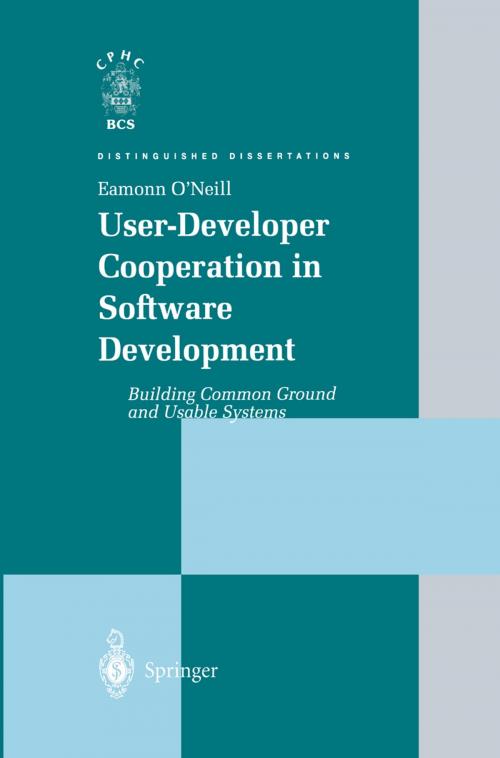User-Developer Cooperation in Software Development
Building Common Ground and Usable Systems
Nonfiction, Computers, Advanced Computing, Programming, User Interfaces, Software Development, General Computing| Author: | Eamonn O'Neill | ISBN: | 9781447103554 |
| Publisher: | Springer London | Publication: | December 6, 2012 |
| Imprint: | Springer | Language: | English |
| Author: | Eamonn O'Neill |
| ISBN: | 9781447103554 |
| Publisher: | Springer London |
| Publication: | December 6, 2012 |
| Imprint: | Springer |
| Language: | English |
The topic of the research reported here is direct user participation in the task-based development of interactive software systems. Building usable software demands understanding and supporting users and their tasks. Users are a primary source of usability requirements and knowledge, since users can be expected to have intimate and extensive knowledge of themselves, their tasks and their working environment. Task analysis approaches to software development encourage a focus on supporting users and their tasks while participatory design approaches encourage users' direct, active contributions to software development work. However, participatory design approaches often concentrate their efforts on design activities rather than on wider system development activities, while task analysis approaches generally lack active user participation beyond initial data gathering. This research attempts an integration of the strengths of task analysis and user participation within an overall software development process. This work also presents detailed empirical and theoretical analyses of what it is for users and developers to cooperate, of the nature of user-developer interaction in participatory settings. Furthermore, it makes operational and assesses the effectiveness of user participation in development and the impact of user-developer cooperation on the resulting software product. The research addressed these issues through the development and application of an approach to task based participatory development in two real world development projects. In this integrated approach, the respective strengths of task analysis and participatory design methods complemented each other's weaker aspects.
The topic of the research reported here is direct user participation in the task-based development of interactive software systems. Building usable software demands understanding and supporting users and their tasks. Users are a primary source of usability requirements and knowledge, since users can be expected to have intimate and extensive knowledge of themselves, their tasks and their working environment. Task analysis approaches to software development encourage a focus on supporting users and their tasks while participatory design approaches encourage users' direct, active contributions to software development work. However, participatory design approaches often concentrate their efforts on design activities rather than on wider system development activities, while task analysis approaches generally lack active user participation beyond initial data gathering. This research attempts an integration of the strengths of task analysis and user participation within an overall software development process. This work also presents detailed empirical and theoretical analyses of what it is for users and developers to cooperate, of the nature of user-developer interaction in participatory settings. Furthermore, it makes operational and assesses the effectiveness of user participation in development and the impact of user-developer cooperation on the resulting software product. The research addressed these issues through the development and application of an approach to task based participatory development in two real world development projects. In this integrated approach, the respective strengths of task analysis and participatory design methods complemented each other's weaker aspects.















